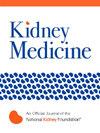Acute-Onset Posttransplant Lymphoproliferative Disorder After Kidney Transplant
IF 3.4
Q1 UROLOGY & NEPHROLOGY
引用次数: 0
Abstract
Posttransplant lymphoproliferative disorder (PTLD) encompasses a spectrum of potentially life-threatening lymphoid proliferations that can arise after solid-organ transplantation, with a bimodal onset typically occurring approximately 12-14 months or approximately 4 years after transplant. Here, we present a novel case of a patient who developed PTLD with an unusually rapid onset, occurring just 7 weeks after receiving a deceased donor kidney transplant. The patient, an Epstein-Barr virus (EBV)-negative recipient of an EBV-positive donor kidney with a complete human leukocyte antigen mismatch, experienced early posttransplant complications including bacteremia and fungemia. These infections, in conjunction with high-risk EBV serostatus and possible underlying genetic susceptibility, may have contributed to uncontrolled B-cell proliferation in the setting of the patient’s impaired immune surveillance. Kidney biopsy confirmed EBV-positive monomorphic diffuse large B-cell lymphoma. The patient was successfully treated with rituximab and reduction of immunosuppression, resulting in resolution of EBV viremia. This case underscores the need to consider PTLD even in the very early posttransplant period, especially in EBV-mismatched recipients, and highlights the complex interplay among infections, immunosuppression, and lymphoproliferative disease pathogenesis.
肾移植后急性淋巴细胞增生性疾病
移植后淋巴细胞增殖性疾病(PTLD)包括实体器官移植后出现的一系列可能危及生命的淋巴细胞增殖性疾病,通常在移植后约12-14个月或约4年出现双峰发病。在这里,我们报告了一个新病例,患者在接受已故供者肾脏移植后仅7周就发生了异常快速的PTLD。该患者是EBV阳性供体肾脏的EBV阴性受体,具有完全的人类白细胞抗原错配,经历了早期移植后并发症,包括菌血症和真菌血症。这些感染,连同EBV高危血清状态和可能潜在的遗传易感性,可能在患者免疫监测受损的情况下导致b细胞增殖失控。肾活检证实ebv阳性单形态弥漫性大b细胞淋巴瘤。患者接受利妥昔单抗治疗成功,免疫抑制减轻,EBV病毒血症得到缓解。该病例强调了即使在移植后早期也需要考虑PTLD,特别是在ebv不匹配的受者中,并强调了感染、免疫抑制和淋巴增生性疾病发病机制之间复杂的相互作用。
本文章由计算机程序翻译,如有差异,请以英文原文为准。
求助全文
约1分钟内获得全文
求助全文

 求助内容:
求助内容: 应助结果提醒方式:
应助结果提醒方式:


